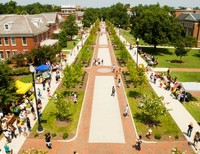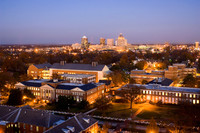Double Degree Option with the University of North Carolina at Greensboro (UNCG)
Beginning in the winter semester of 2012-2013, we will offer students of the International Administration and Conflict Management (IACM) program at the University of Konstanz the opportunity to complete a double degree program in cooperation with the University of North Carolina at Greensboro (UNCG).
Students can spend the second year of their studies in the IACM program at UNCG in the corresponding Master program in “Conflict and Peace Studies (CPS)." In principle, all students enrolled in the Master of Politics and Public Administration program at Konstanz can apply to participate in the Double Degree Program in North Carolina. But, students should realize that the format of the double degree cooperation requires that a degree within the IACM focus be completed. As a result, a very strict approach is taken when selecting the agreed-upon curriculum taught at both universities. This is based on a predetermined and limited time spent at both universities (one year at each). At the end of their Master program, students will have completed both a degree at the University of Konstanz in Politics and Public Administration, as well as a degree at the University of North Carolina at Greensboro (UNCG) in Conflict and Peace Studies.
The Idea Behind the Cooperation
The driving idea behind establishing the Double Degree Cooperation with the UNCG MA Program "Conflict and Peace Studies” was the recognition of a superior compatibility between the two programs. Both programs focus mainly on the review of conflicts, specifically conflict management and dispute resolution. The two programs differentiate themselves by the approaches they use, for example, the IACM Program focuses primarily on the conflict management activities of international organizations like the United Nations in the sphere of international and internalized conflict. This means that one should approach the subject matter on the macro level, with a background and basis of political science, public administration and organizational and management knowledge. In most cases, the curriculum and research reaches the meso level as well, for example, the analysis of administration, police, jurisdiction and infrastructure.
The approach of the CPS program is focused on teaching individual skills in the field of mediation and conflict review, of which the origin lies accordingly on the micro level and is aligned practically. But, the CPS program reaches into the meso level as some skills in the field of Dispute Resolution within businesses and organizations are taught and proportional processes are analyzed. We also find that only in exceptional cases, there is a reference to international framework on the macro level.
Keeping in mind both sides, a unique and complimentary synergy can arise through the cooperation and assist in diversifying the education of the students at both universities. The framework of the IACM-Program is meant to instill students with the knowledge of classification and a systematic analysis of conflicts, while the CPS program focuses on students developing a practical approach to mediation and conflict management using actual case studies. Through participation within the double degree cooperation, students will consequently be provided with a unique opportunity to analyze conflict management and dispute resolution processes on all levels and experience the practical perspective.
Therefore, the program is especially focused on students that would like to carry out a career in a conflict or mediation-oriented organization after the completion of their studies. Such career paths could be focused on international organizations, governmental organizations, policy institutes or think tanks, NGOs, or even a future academic career.
Curriculum
The curriculum is organized so as to ensure that students who are away for a year are able to earn the appropriate amount of credits. Furthermore, students should take into account the special advantages of studying in North Carolina during this year, so as to compliment the cooperation program to the best extent possible. In exchange, there is some flexibility allowed when choosing electives in Konstanz or skill-based courses at UNCG.
Accordingly, the break-down of the program is as follows:
First year: Konstanz |
1st sem. |
Research Design I (9 ECTS) |
28 |
|---|---|---|---|
2nd sem. |
Research Design II (9 ECTS) |
23 |
|
Second year: Greensboro |
3rd sem. |
600 Theoretical Foundation (6 ECTS) |
24 |
4th sem. |
605 Organizational (6 ECTS) |
48 |
|
Total credits earned: |
123 |
||
oder
First year: Greensboro |
1st sem. |
600 Theoretical Foundation (6 ECTS) |
27 |
|---|---|---|---|
2nd sem. |
605 Skills and Techniques (6 ECTS) |
21 |
|
Summer |
CPS course (6 ECTS) |
6 |
|
Second year: Konstanz |
3rd sem. |
Research Design I (9 ECTS) |
30 |
4th sem. |
Colloquium (6 ECTS) |
36 |
|
Total credits earned: |
120 |
||
Application Procedures
Any student accepted and enrolled into the MA program of Politics and Public Administration in Konstanz can apply for the dual degree cooperation. The deadline is the first of December in order to participate in the program beginning fall of the next year. However, we encourage all applicants to turn in their application materials by the first of November, in order to provide the chance to participate in other exchange programs if they are not accepted into the Dual Degree cooperation. The program at UNCG begins in September.
The evaluation process will be carried out internally by the Department of Politics and Public Administration in cooperation with the International Office at the University of Konstanz. The application documents to be turned in include the following:
- The TOEFL-Test
- Recommendation letters from two university professors (see the form on the International Office webpage)
- Study Proposal in English
- CV, written out in paragraph form
- Transcript
- Copy of your bachelor degree
- Application Form
Links to the pages sponsored by the International Office at Konstanz (only available in German, but the documents are in English):
-A general description of the exchange programs offered for North America
Please email the IACM-Coordinator or the Coordinator of the Master Program for the Department of Politics and Public Administration, Werner Palz, if you are interested:
IACM Coordinator: IACM[at]uni-konstanz.de
Werner Palz: MA.Polver[at]uni-konstanz.de
*Interested students of American nationality will be automatically directed to inquire with UNCG itself concerning applying for this program.
Financial Support
As the double degree cooperation between UNCG and the University of Konstanz is supported by the German Academic Exchange Service, successful applicants of German nationality are guaranteed a scholarship for the entire academic year. Unfortunately, students of other nationalities cannot be accepted for this scholarship. For further details concerning the extent of this scholarship, feel free to contact either of the Coordinators listed above.
Some Impressions of Greensboro
North Carolina and the City of Greensboro can conceivably be described as a ‘progressive island’ in the south of the United States. The history of the region and the city itself stands out from others in the area. As of today, this can be seen by many historical and current public establishments and streets, as well as a very interesting civil rights museum and the general mindset of the inhabitants. We were able to take in the appearance of a very attractive campus on our trip to coordinate the partnership, as well as being able to experience the many high-end services available to students, such as the gym, art and music institutions or the supportive and friendly International Office and the Student Advising Department. 15 other universities are located in the same area, including High Point, Duke, or other UNC campuses. Therefore, students will have the opportunity to check out other campuses and experience US college life.
A very useful guide to the school, including information about arrival, orientation, accommodation, meal plans, estimated housing costs, services and other expenses that you should expect to incur as an exchange student can be found here. Also, here is the link to the UNCG housing website.
Some testimonials from current students studying in Greensboro
Juliana Caputo from UNCEP Pontificia Univerdade Catolica do Parana in Brazil:
“One of the main reasons I chose the University of North Carolina at Greensboro was its location. I was interested in living in the southeastern United States, and experiencing a more mild climate than other exchange destinations. The UNCG international program has been excellent. The international house, or "I-House", is to me the best part of the experience. The majority of international students are housed in one dorm building, and being able to meet and interact with people from so many different cultures is a very unique opportunity. I would recommend the exchange program to anyone who has the slightest interest in it. Being an exchange student is a life-changing experience, and is something I will never forget.”
Jihye Choi from Yonsei University in South Korea:
“So far, I think I got what I wanted in an exchange experience. Last semester, I met so many international people from Europe, Asia, and all over the world. It was one of the most priceless experiences of my life. I am still in touch with the people who I met last semester. Also, it was really easy to adjust to a different country, America’s culture, since many of the Americans in the International House were always eager to help exchange students, and the IPC staff would help me as soon as possible whenever I had any issues.
During the summer, I found a few internship positions. I found two internship positions which were related to my major, political science. For one of my internships, I worked at Congressman Coble’s office. My second internship was with the American Friends Service Committee (AFSC), which is non-profit organization to help undocumented immigrants. Those jobs were really helpful for me to understand how the politics and non-profit organizations work in America.
I truly appreciate all of my experiences here in Greensboro, and for being helped by a lot of people. I’ve experienced things that I could not have experience in my home town. After going back to Korea, Greensboro and UNCG will be my second hometown and second home university.”
Further Information
University of North Carolina, Greensboro
MA „Conflict and Peace Studies“
Greensboro
News
-

Zimbabwe: What if not a coup?
Was President Robert Mugabe’s forced retirement really a coup d’état in disguise? And what policies will his successor, Emmerson Mnangagwa, now offer the country? A conversation with the political scientist and expert on Africa, Martin Welz
-

15. March 2017
Wolfgang Seibel to be member of the scientific advisory board of the journal “Guerres mondiales et conflits contemporains”
Prof. Wolfgang Seibel has been named a member of the scientific advisory board of the French journal “Guerres mondiales et conflits contemporains.”
Wolfgang Seibel is professor of Political and Administrative Science, University of Konstanz. He is member of the executive board and the plenary... -

6. March 2017
New release: The Management of UN Peacekeeping. Edited by Julian Junk, Francesco Mancini, Till Blume, and Wolfgang Seibel
Coordination, Learning, and Leadership in Peace Operations
Boulder: Lynne Rienner 2017



